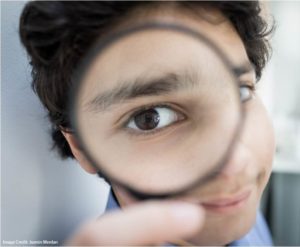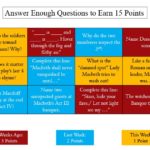Conventional wisdom tells us that curiosity is bad for cats but good for learning.
What does psychology research tell us?
We’ve got a few decades of research showing links between curiosity and learning. A precise description of those links a) would be REALLY helpful for teachers, and b) is hard to complete.
In a recent study, Dr. Shirlene Wade and Dr. Celeste Kidd tried to fill out that description.
Four Key Variables
Wade and Kidd invited adults to take a trivia test. The test included quite challenging questions: “What U.S. president’s face graces a $100,000 bill?” (In case you haven’t handled any $100,000 bills lately, the answer is: Woodrow Wilson.)
After the participants guessed the answer, they rated a) their confidence that they got the answer right, and b) their curiosity about the actual answer. They then saw the correct answer to the question.
After being distracted for a while, they then tried to answer the same trivia questions again.
This research paradigm allowed Wade and Kidd to measure
Participants’ curiosity: how much did they want to know the answer?
Their confidence: how much did they think they already knew?
Their prior knowledge: how much did they actually know?
and
Their learning: how many additional answers did they get right?
And, of course, Wade and Kidd could start looking for relationships among these variables.
What Promotes Curiosity?
Participants, of course, weren’t equally curious about all the answers. Instead, their curiosity depended on their confidence.
Specifically, when participants were almost sure — but not completely sure — that they knew the right answer, then they were most curious.
Notice, crucially, that their actual prior knowledge didn’t predict curiosity. So, if they thought they were probably right (high confidence) but were actually quite badly wrong (low prior knowledge), they still were highly curious about the answer.
What Promotes Learning?
The early part of the study shows that confidence (not actual knowledge) predicts curiosity.
But: what predicts learning? If a participant got a question wrong initially, what helped him/her learn the correct answer and get it right on the later test.
The answer is: not curiosity. Instead, the answer is actual prior knowledge.
So, back to the question about the $100,000 bill. If I had predicted that … say … Mahatma Gandhi’s picture were on the bill, well, that’s just wildly wrong.
But, if I had predicted that William Howard Taft’s face were on the bill, well, I was pretty close. If nothing else, Taft served as president immediately before Wilson. And, Taft was also Chief Justice of the Supreme Court — so his historical importance might justify being on such a big bill.
So: students who think they’re almost right will be more curious; students who are almost right will learn faster.
Teaching Implications
As always, I should emphasize that this is just one study. And, in this one study, adults learned answers to trivia questions. They were tested almost right away.
This research paradigm leads to interesting findings, but it doesn’t tell us exactly how to teach our students (who might not be adults) our curriculum (which, almost certainly, isn’t answers to trivia questions). And, we can’t be 100% certain that it resulted in long-term learing.
In any case, I think the teaching implications are: we should focus both on our students’ curiosity and on their prior knowledge.
That is: we want them to reasonably believe that they’re close to learning the answer. And, we want them to have enough prior knowledge to absorb the answer when they get it.
That interpretation doesn’t sound shocking.
However, it does offer some useful warnings. If we hear of a teaching methodology that focuses entirely on curiosity, or entirely on prior knowledge, we should hesitate before embracing it.
After all: curiosity inspires students to keep working. And prior knowledge allows them to learn from their curiosity-inspired efforts.





For me, curiosity is one of the main reasons to study something. Or, to paraphrase, I am interested in a lot of things (how electricity works, how the brain works) and to find out, I am studying physics or chemistry or biology. It doesn’t encourage me to know all the physical laws, but at least I know the theoretical basis.
That’s how it works!